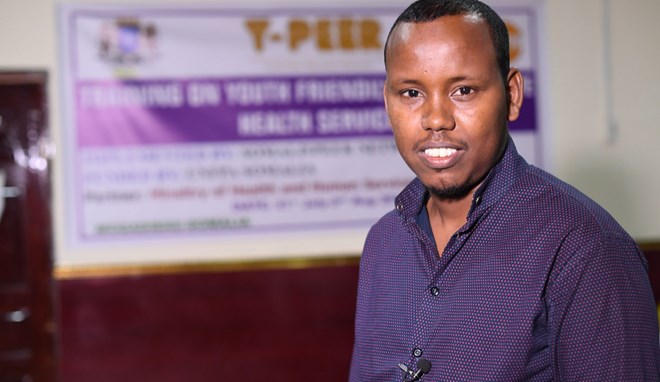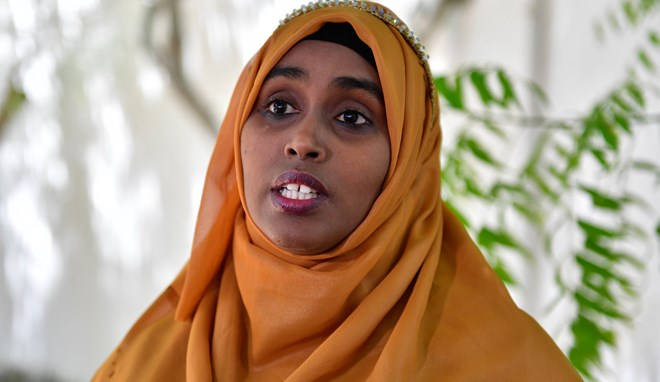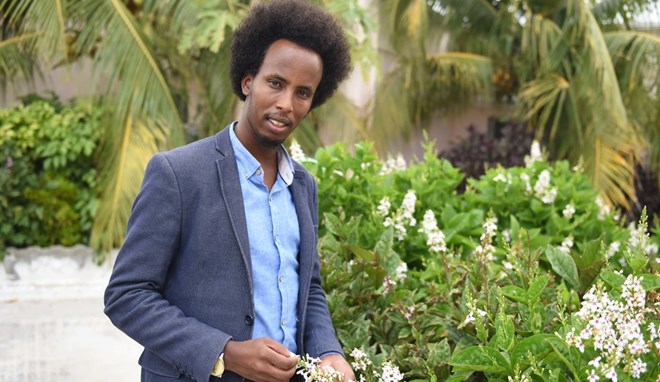
Saturday August 12, 2017
Young activist seeks to improve lives of Somali youth

For the last six years Mohamed Arshad Ibrahim has been at the forefront of efforts to mobilize and empower young people in Somalia. Mohamed is the Executive Director of the Youth Peer Education Network in Somalia (Y-PEER Somalia), a non-profit organization bringing together young people and youth organizations and leading peer-to-peer education programmes.
“We are members of the global network for Youth, Peace and Security, and we advocate for our country to give youth a greater voice in decision-making at local, regional and national levels,” the 28-year-old Mohamed explains.
The organization’s work reflects the message of UN Security Council Resolution 2250 (2015), which urges Member States to set up mechanisms that enable young people to participate meaningfully in peace processes and dispute resolution.
“By discussing issues that affect them, youth come up with solutions, which we can share with the government as well as the international community,” Mohamed says.
Mohamed notes a recent increase in the number of youth organizations in Somalia and believes that these groups can influence the country’s agenda of peace and development.
A crucial aspect of Y-PEER’s activities focuses on anti-radicalization campaigns, through which they target vulnerable youth who might join militant groups. Mohamed strongly believes that youth should play a major role in peace building and conflict resolution. “I look forward to a more stable and peaceful Somalia, where all the rights of citizens are respected and aspirations are met,” he says.
“As youth, we aspire for a Somalia with vibrant and functional education and health sectors, which meet the needs of the people. We want a Somalia led by an effective government that promotes equality and safeguards the freedoms of its people,” notes Mohamed.
The scope of Y-PEER Somalia’s activities is not limited to peace advocacy. The organization also hosts workshops to educate young people on hygiene and reproductive health issues to ensure they lead healthy lives so they can contribute effectively to the development of Somalia. Currently, Y-PEER Somalia operates in the capital Mogadishu, Puntland and Somaliland, and plans to expand to the regional capitals of South West, Jubbaland and Galmudug states.
The UN officially recognizes youth development as one of the core priorities of its mandate. The UN believes that responding to the needs and aspirations of Somali youth is crucial to building lasting peace and stability in Somalia. Over the last few years the UN has been working to bolster youth programmes and empower young Somalis to become partners in its peace- and state-building efforts.
Young Somali woman seeks a greater role for youth in peacebuilding

Naima Adan Elmi champions the youth cause through the Save Somali Youth Organization (SASOYO), a non-governmental organization she founded in 2009.
“The youth form the biggest part of the Somali population, yet most of them have no jobs and no means of livelihood,” Naima explains. “This destitution, which forces youth into crime and other negative practices, prompted my colleagues and me to act.”
Naima believes that Somali youth should contribute to the peace and development of their country. For this wish to become reality, she says youths should be educated and master a variety of skills.
"In a country recovering from decades of war, peace is of utmost importance going forward. Somali youth must be at the centre stage in the peacebuilding process," notes the 33-year-old activist.
“At SASOYO we equip the youth, especially young women, with skills and encourage them to participate in politics.”
SASOYO was instrumental in mobilizing young Somalis to participate in the 2016-2017 electoral process, with the aim of increasing their numbers in the Federal Parliament.
About 18 per cent of the members of the current bicameral parliament are under the age of 35, which represents an important advance for young people in Somali politics. A strong believer in young people as agents for change, Naima has been engaged in several youth empowerment projects.
“We organize workshops and participate in radio and television talk shows to sensitize the youth on the dangers of female genital mutilation, early marriage and violent extremism. We also advocate against young people taking the perilous journey across the Mediterranean in search of greener pastures in Europe,” Naima says.
With a membership of 1,000 youths, SASOYO has a presence in Mogadishu, Galkaacyo, Baidoa, Belet Weyne and Kismaayo.
With SASOYO’s support, youths acquire vocational skills such as tailoring and basket weaving. The proceeds made from the sale of these items are ploughed back into their businesses or used to support the organization’s projects, which include literacy classes in which 40 young women are currently enrolled.
Naima takes an optimistic view of what the future holds for the youth in Somalia.
“I see a Somalia with an effective government and strong security institutions, capable of handling the security challenges of the country. Security and economy are the two most critical sectors that Somalia needs to fix, and then everything will fall in place,” she concludes.
The UN has officially recognized youth development as part of its mandate in Somalia. The UN recognizes the role young Somalis can play in the country's peace- and state building processes.University graduate spearheads project to beautify Mogadishu

Mogadishu - Mohamed Tahlil Mohamed is brimming over with ideas. The 27-year-old university graduate is the initiator of “City Flowers”, a youth-led project that seeks to erase the scars of war from the streets of the Somali capital and beautify the whole city.
Started in July 2016, “City Flowers” mobilizes young people to clean up Mogadishu and make it a more livable city.
“We consulted each other on what changes we can bring as youth. We then came up with the initiative of flowers of peace. We started planting flowers along the main roads such as the Maka Al-Mukarama Road and other areas,” Mohamed explains.
As a driving force of this project, Mohamed is happy to see his efforts already paying off. It is easy to spot manicured flower gardens alongside newly painted road kerbs, thanks to “City Flowers”.
“Flowers are attractive and symbolize peace,” Mohamed explains. “We made voluntary contributions of money and planted the flowers. Initially, the flower beds were not fenced, and animals grazed on the plants, destroying them. We then came up with ways to fence off the flower beds,” he adds.
Mohamed gets his motivation from a deeply felt need to restore the past glory of Mogadishu, of which he has heard many stories. Personally, Mohamed has no recollection of pre-war Somalia, having been born in 1990, a year before the civil war broke out.
A native of Cadaado in Galgadud region, Mohamed and his family experienced Somalia’s darkest years, choosing to remain in the country even at the height of the fighting.
He went to school in Mogadishu and later moved to Malaysia, where he obtained a Master’s Degree in Business Administration. Soon after his graduation, Mohamed returned to Somalia to help rebuild his country.
“We are young people who want to change the image of our city, the damage and ruins left by the civil war,” he says, emphasizing his resolve to give back to his country. “I would like to see Mogadishu become like any other city in the world. We want to restore its beauty and completely remove the remnants of the civil war.”
Mohamed is one of thousands of young Somalis who are changing the destiny of their country through social enterprises. With one of the youngest demographic profiles in the world, Somalia’s future depends on its youth, who constitute an estimated 81.5 per cent of the population.
Mohamed’s spirit of initiative and positive determination embodies the UN agenda for youth. The United Nations emphasizes the importance of youth participation in peacebuilding and development efforts in Somalia.
Apart from the city facelift, Mohamed and his youth group have also partnered with the Banadir Regional Administration, which governs Mogadishu city, to implement a road safety campaign. The initiative involves the marking and installation of road signs to promote the safety of pedestrians.
“When we wanted to paint a pedestrian crossing, I had to use instructions from ‘Google’ to learn how it is done,” Mohamed explains. Through sheer determination, the pedestrian crossings are now standardized.
Despite these efforts, there are skeptics. “Some people misunderstood the work that we do. When they see us planting flowers, they think we are funded by international non-governmental organizations. But I tell them that this is our country and we have to build it, without depending on support from outside. Every country is built by its people. It is our responsibility, not foreigners’, to rebuild Somalia,” he emphasizes.
Mohamed and his youth group plan to expand the beautification and road safety projects to state capitals across Somalia. In addition to these projects, the group also organizes games and other activities for young people. Most recently, they organized a peace gala for youths from all of Mogadishu’s 17 districts.
“Through the gala, we bring together youth from the different neighborhoods of Mogadishu to play and get to know each other. This is part of peacebuilding and helps youth discover and explore their potential,” Mohamed remarks.
He adds that such activities encourage youths to maintain a healthy lifestyle and stay away from crime. “Our intention is to represent Somalia, build youth’s self-confidence and understanding that we are all important for the country and can contribute to its development,” he says.
The UN officially recognizes youth development as one of the priorities of its mandate. In Somalia, the UN recognizes the crucial role young Somalis play as partners in the country's peace- and state building processes.